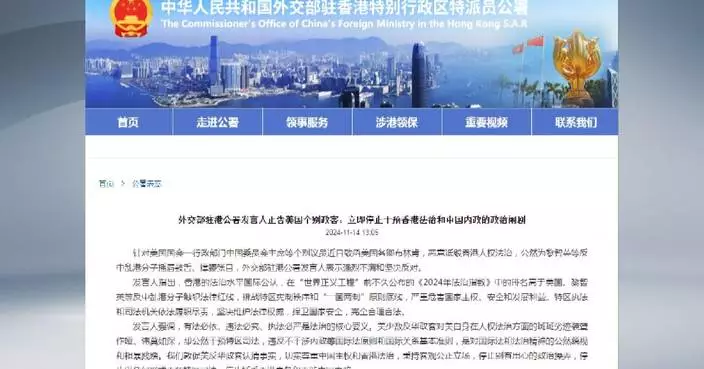China's State Administration of Foreign Exchange has been placing emphasis on coordination with cross-border Renminbi (RMB) policies in efforts to promote the high-standard and institutional opening-up of China's financial market, said an official in a recent interview with China Central Television (CCTV).
The Chinese bond market, the world's second largest, has provided diversified investment and financing channels for global capital.
"RMB assets have independent performance in terms of yield globally, which can help global investors achieve risk diversification in asset allocation. At the same time, RMB has gradually enhanced international influence with its proportion in global cross-border transactions steadily increasing, thus becoming an important choice for global investors to diversify their asset allocations," said Wang Lei, deputy head of the Capital Account Management Department under the State Administration of Foreign Exchange.
By the end of September, 1,152 overseas institutions held 4.39 trillion yuan (about 607 billion U.S. dollars) of bonds in China's interbank market.
Seven overseas institutions entered China's interbank bond market in September.
"We place emphasis on coordination with cross-border RMB policies. So the QFII (Qualified Foreign Institutional Investors scheme), RQFII (Renminbi Qualified Foreign Institutional Investors scheme), CIBM (China Interbank Bond Market) and panda bonds all follow the principle of policy integration on domestic and foreign currencies. We have been promoting the application of uniform rules for same-type transactions on different markets. For example, we use the same foreign exchange management rules to regulate panda bond issuances both on the interbank market and the exchange-traded bond market. And these measures are conducive to gradually establishing a unified and efficient system for financial market opening-up, and promoting the high-standard and institutional opening-up of China's financial market," said Wang.

China's foreign exchange regulator helps promote financial market opening-up: official
China's Ministry of Finance on Wednesday issued 2 billion U.S. dollars worth of sovereign bonds for international investors in Riyadh, the capital of Saudi Arabia.
Of the total, the issuance of three-year bonds stood at 1.25 billion U.S. dollars in value with an interest rate of 4.284 percent, and the issuance of five-year bonds totaled 750 million U.S. dollars with a yield of 4.340 percent.
International investors have shown strong enthusiasm, with the total subscription value amounting to 39.73 billion U.S. dollars, 19.9 times of the issuance amount. In particular, the five-year subscription multiple reached 27.1 times, the highest multiple for global sovereign bonds issued in recent years.
Among the international investors, those from Asia, the Middle East, Europe and the United States accounted for 68 percent, 8 percent, 20 percent and 4 percent, respectively, with the share of Middle Eastern investors reaching a record high.
In terms of investor types, sovereign entities, banks, fund asset management firms, insurance investors and dealer investors accounted for 9 percent, 50 percent, 37 percent, 2 percent and 2 percent, respectively.
"Throughout the issuance process, international investors have actively subscribed to the sovereign bonds. Their geographical distribution is broad, while the types of investors are varied. This fully demonstrates that international investors have high recognition for China's sovereign credit and firm confidence in the long-term high-quality development of China's economy," said Wang Jiaqiang, senior researcher at the Bank of China Research Institute.
The sovereign bonds will be listed on both the Hong Kong Stock Exchange and the Nasdaq Dubai Stock Exchange. This marks the first line of Chinese sovereign bonds to be issued and listed in the Middle East, as well as the first line of Chinese sovereign bonds priced and issued in Saudi Arabia.
Industry insiders say they believe that this issuance will further promote financial exchanges and cooperation between China and Middle East countries and encourage more Chinese institutions to engage in investment and financing activities in the region.
Sovereign bonds are issued by the central government of a sovereign state intending to raise funds to meet the government's fiscal needs. Because the bonds are backed by the credit of the sovereign state, the risk of default is typically low.

China issues 2 billion U.S. dollars of sovereign bonds in Saudi Arabia










